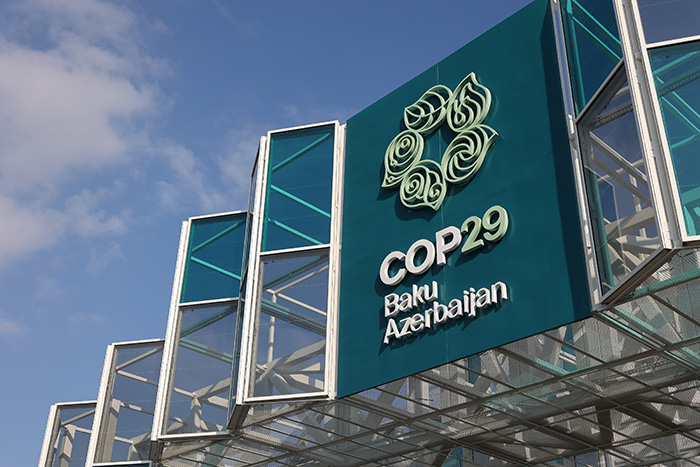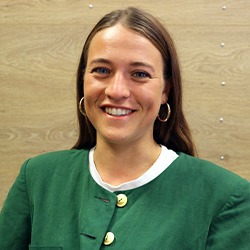Interviews / Climate, Environment, Security
28 November 2024
COP29 in Baku: What Is the Assessment?

COP29 (Conference of the Parties), organized under the auspices of the UN, took place from November 11 to 23 in Baku, the capital of Azerbaijan, a hydrocarbon-producing country. Following COP28 in Dubai, this major international event aimed, in particular, to define the modalities for financing the fight against climate change and the distribution of efforts between the so-called “North” and “South” countries. What were the topics on the agenda? What decisions were adopted during COP29? What perspectives is the next COP in Brazil aiming for? An interview with Mathilde Jourde, researcher at IRIS within the Climate, Energy, and Security Program.
In what geopolitical context was COP29 held? What topics were primarily discussed?
According to Gaïa Febvre, head of international policies at the Climate Action Network, “multilateralism is no longer the same as in 2015.” COP29, held in Baku from November 11 to 22, took place in a particularly tense international climate, marked by the fragmentation of states, the resurgence of conflicts in Europe and the Middle East, and the rise of populist and climate-skeptical rhetoric, particularly in the United States and Argentina. These tensions were reflected in the notable absence of several leaders, such as Ursula von der Leyen, Emmanuel Macron, Olaf Scholz, Joe Biden, Xi Jinping, and Lula da Silva. In comparison, COP28 in Dubai had raised hopes with historic advances, notably a historic agreement on the “transition away from fossil fuels” and the creation of the “loss and damage” fund to assist the most vulnerable countries in facing climate impacts. In continuity, COP29, often referred to as the “COP of finance,” aimed to bring the financial commitments associated with these agreements to fruition.
Two major agreements emerged from it. The first, adopted at the opening, concerns the establishment of a new carbon market, thus unlocking negotiations on Article 6 of the Paris Agreement, which had been suspended for nearly a decade. The goal of this agreement is to establish a new, more effective system than the current voluntary market, which facilitates issues related to the carbon market. This new framework requires project holders to assess and mitigate the environmental and social impacts of their activities and demonstrate their contribution to the sustainable development goals. However, this agreement was criticized by several NGOs for the lack of transparency surrounding its adoption and the many unresolved issues.
The second agreement, concluded after extended discussions, concerns the “new collective quantified goal” (NCQG), aimed at strengthening the financial solidarity of the “Global North” from Annex I countries toward the nations of the “Global South.” In 2009, at Copenhagen, wealthy countries committed to mobilizing $100 billion per year for developing countries. This goal, which was finally reached with a two-year delay, required a revision before 2025 under the Paris Agreement. Negotiations surrounding this amount, known as the “quantum,” were one of the main issues of COP29. While the countries of the South demanded $1,300 billion, the parties at the conference ultimately agreed on a quantum of $300 billion. The details of these funds, whether in the form of loans or grants, or their origin (public, private, multilateral, bilateral), will need to be clarified during upcoming intermediate negotiations.
What assessment can be made of this COP, particularly regarding financing the fight against climate change?
For Wopke Hoekstra, the European Union’s Commissioner for Climate, COP29 “will be remembered as the beginning of a new era for financing the fight against climate change.” However, this assessment is not shared by the countries of the “Global South,” which found the amount “derisory,” according to Chandni Raina, a member of the Indian delegation.
Other countries, such as France, also lamented this agreement as “not up to the stakes.” Adjusted for inflation, the sum of 300 billion dollars is nearly equivalent to the 100 billion dollars promised in 2009, according to members of the Africa Group. Several countries also criticized the nature of these financial contributions, notably the partial allocation in the form of loans, which risks exacerbating the debt crisis affecting the economies of the “Global South.” To express their dissatisfaction, the most vulnerable countries loudly walked out of a negotiation during the COP’s extensions to protest against the proposed agreement, which fell far short of their financial assistance demands. Additionally, discussions around the NCQG (New Quantified Collective Goal) dominated the first week of negotiations, but the G20 failed to break the deadlock, settling for reiterating the importance of setting a financial target in Baku.
Despite its ambitions, the European Union also expressed disappointment at the failure to broaden the list of contributors established in 1992. Western countries had sought to include other economic powers, such as China, Singapore, South Korea, and some Gulf States, due to their substantial greenhouse gas emissions. However, these states refused to join the group of contributors, limiting themselves to voluntary participation.
The absence of an explicit mention of the phase-out of fossil fuels, a major achievement of COP28, also caused frustration among certain groups, including EU countries. This omission can be partly explained by the position taken by Azerbaijani President Ilham Aliyev at the start of the conference, who stated, “Oil and gas are a gift from God.” The final document published on Sunday during the plenary emphasizes that “transition fuels can play a role in facilitating the energy transition while ensuring energy security.” However, IPCC scientists regularly stress the importance of ending all investments in these energy sources, which are responsible for over 75% of global greenhouse gas emissions. Saudi Arabia actively worked to remove any explicit references to COP28 commitments from the new agreements, an effort supported by the 1,700 fossil fuel lobbyists present in Baku. According to a report by InfluenceMap, they notably used narratives aimed at blocking discussions, such as speeches on “skepticism about solutions” and “accessibility and energy security.”
Finally, COP29 was even more disappointing given that the focus on the NCQG negotiations overshadowed other crucial issues, such as those related to mitigation, adaptation, the global stocktake, and gender issues.
What are the prospects for COP30, scheduled in one year in Belém, Brazil?
Following a COP29 with a mixed outcome, COP30, scheduled for 2025 in Belém, Brazil, will address crucial issues. The discussions initiated in Baku, particularly regarding the modalities of financing for the NCQG, will be further explored, while postponed topics such as the adoption of the text on mitigation and the “loss and damage” fund will be on the agenda.
As part of the Paris Agreement, countries must update their Nationally Determined Contributions (NDCs) before February 2025. This deadline coincides with the tenth anniversary of the Paris Agreement, marking a new cycle of climate ambitions. Some countries have already unveiled their NDCs, such as the United Kingdom, Brazil, and the United Arab Emirates, highlighting certain disparities. The United Kingdom notably revised its commitments upward and pledged to reduce its greenhouse gas emissions by “at least 81%” by 2035, a commitment praised for its ambitious targets. Brazil also increased its greenhouse gas reduction target from 59% to 67% by 2035. Finally, the United Arab Emirates aims for a 47% reduction by 2035, an objective deemed insufficient to meet the goals of the Paris Agreement by the Climate Action Tracker.
COP30 will also shine a spotlight on issues that were secondary during COP29, such as deforestation, a particularly symbolic issue in the Amazon region that will host the negotiations. In response to the criticisms and disappointments generated by the previous edition, Brazil has announced its ambition to make this conference a true turning point. Marina Silva, the Minister of the Environment, even referred to COP30 as the “COP of COPs.“

